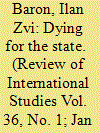| Srl | Item |
| 1 |
ID:
134730


|
|
|
|
|
| Summary/Abstract |
This article is concerned with addressing the following hypothesis, originally presented in Millennium in 2001: International Relations theory does not influence other academic fields to the extent that it suggests that it should. This claim is re-examined in light of the growth of IR over the past decade. Using a variety of evidence, including a close examination of the Social Sciences Citation Index, I conclude that IR (still) does not have much influence outside of the IR academic community. I also argue that while it is not reasonable to expect scholars who write on global politics but belong in other academic fields or disciplines to turn to IR, the way that IR defines itself suggests that they should. Consequently, it follows that IR needs to be doing more in order to make our work of greater relevance to, at minimum, those fields of scholarship that IR borrows from. I suggest that the reason why IR has continued to have little influence in other fields is because of the way IR sets itself up as a subject concerned with an anarchical order made up of sovereign states.
|
|
|
|
|
|
|
|
|
|
|
|
|
|
|
|
| 2 |
ID:
093793


|
|
|
|
|
| Publication |
2010.
|
| Summary/Abstract |
This article introduces the problem of having to risk one's life for the state in war, asking first why this question is no longer asked in the just war literature and then suggesting five issues that relate to this question: 1) that of individual consent, 2) whether or not any state can be justified in obliging its citizens in this regard and whether or not the type of government is important, 3) whether or not the problem of the obligation differs between conscript and volunteer armies, 4) the problem of political obligation and how any individual could be justifiably obliged to risk his or her life for the state in war, and 5) the question of whether a citizen may be obliged to go into any war. The argument is that these questions are no longer given much attention in the just war literature because of the way that the concept of proper authority has come to be understood. The article concludes by suggesting that the problem of the 'obligation to die' should be included in our understanding and use of just war theory and the ethics of war.
|
|
|
|
|
|
|
|
|
|
|
|
|
|
|
|
| 3 |
ID:
165445


|
|
|
|
|
| Summary/Abstract |
While international relations scholars make many claims about violence, they rarely define the concept. This article develops a typology of three distinct kinds of violence: direct, indirect, and pacification. Direct violence occurs when a person or agent inflicts harm on another. Indirect violence manifests through the structures of society. We propose a third understanding of violence: pacification. Using a phenomenological methodology, and drawing on anarchist and postcolonial thought, we show that the violence of pacification is diffuse, inconspicuous, intersubjective, and structured into the fabric of society. This understanding of violence matters for the study of international relations in general and research on the liberal peace in particular. We argue that the spread of liberal institutions does not necessarily decrease violence but instead transforms it. Our phenomenological analysis captures empirical trends in human domination and suffering that liberal peace theories cannot account for. It reveals how a decline in direct violence may coincide with the transformation of violence in ways that are concealed, monopolized, and structured into the liberal order. We call this process liberal pacification.
|
|
|
|
|
|
|
|
|
|
|
|
|
|
|
|